Matthew Yglesias's Blog, page 2279
June 10, 2011
Unbalanced Deflation And Its Consequences
Something that I think often isn't reported right in the business press is the meaning of real estate prices. All else being equal, there's no reason to think of a market in which homes are expensive as "good" and one in which homes are cheap as "bad." A home is a useful thing to get your hands on, so when homes are cheap it's easier for people to get their hands on something useful. That's a good thing.
The problem we're dealing with is something more specific. People took out loans to buy expensive homes, and now that the homes have become cheaper that's left the country with more debt. A Calculated Risk chart illustrates this:
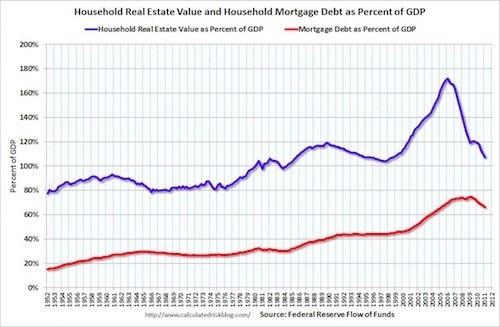
The problem here is really with the expensive mortgages, not the cheap houses. Over the long run, an equilibrium in which houses are cheap and therefore mortgages are cheap too would be an excellent one to reach. The trouble is that when you try to reach this equilibrium through liquidation rather than inflation you get this unbalanced transition period in which the ratio of debts to assets goes up. And that, by the same token, is why monetary stimulus is preferable to trying to force people to swallow nominal wage cuts. Either reduces the cost of hiring a new worker, but one deflates debts along with incomes and the other is unbalanced and causes long painful transitions. Unfortunately, we're on the bad path.


The Price of Manhattan
I continue to be interested in the question of the price of land (as opposed to the price of structures) and this New York Fed research on "The Price of Land in the New York Metropolitan Area" (PDF) is very interesting. It shows that land prices can be closely tied to distance from the Empire State Building:

It's a reminder that, among other things, people living in expensive houses in Manhattan and the convenient parts of Brooklyn and Queens aren't just experiencing "high housing costs" or a "high cost of living;" they're specifically purchasing a commodity — space with easy access to the core business districts of America's largest city — that the market puts a very high price on. About a month ago, I saw some folks mocking Ed Glaeser for thinking that Manhattan isn't dense enough. And obviously there's a sense in which that contention is laughable — it's really dense! But the point is that the density in New York City, though high, is actually low relative to the market price of the land the structures are on.


June 9, 2011
Tim Pawlenty's Back To Bush Economic Agenda
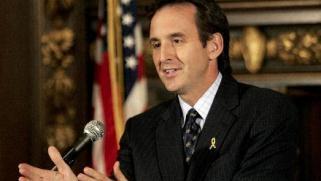
As I said before, Tim Pawlenty's economic policy speech was clear enough to tell you what direction he wants to take the country. It's a direction Ross Douthat accurately describes as a return to Bushism and something of a retreat from Paul Ryan's austerity conservatism:
The speech has some of the Ryan budget's political vulnerabilities, in a sense, without the Ryan's budget's guts: Whereas Ryan actually took the entitlement bull by the horns, Pawlenty seems to use his supply-side growth projections as a substitute for Medicare reform instead of adding them on as gravy. Reading it, you would think that the Bush economy was a huge, roaring success, since Pawlenty has little to say about the pocketbook issues that helped elect Barack Obama in the first place (wage stagnation, health care costs, etc.). And reading the excited reception that the speech is getting from movement organs, it's clear that a great many conservatives have learned next to nothing from the trends that turned them out of office just a few short years ago.
That's right on. And the problem here is that the Bush diagnosis is less plausible than ever. Bush ran during a period of budget surpluses that he claimed ought to be returned to taxpayers. And the right has a hardy perennial story about tax cuts increasing labor supply that doesn't make a ton of sense in an economy where the unemployment rate is already 9.1 percent.


Decline Of Local News Should Bring Spike In Public Sector Corruption And Incompetence

By Matthew Cameron
The Federal Communications Commission's report titled "Information Needs of Communities" probably won't generate as much buzz as a political sex scandal, but at least one of its findings should be a cause for concern among citizens. The study concludes that "we now face a shortage of local, professional, accountability reporting" which "manifests itself in invisible ways: stories not written, scandals not exposed, government waste not discovered, health dangers not identified in time, local elections involving candidates about whom we know little."
The report indicates that the decline in local reporting is a result of "dislocations caused by seismic changes in media markets." In other words, local newspapers' subscriber bases are drying up because readers are migrating online. Despite the limited success of services such as AOL's Patch, online media has not been able to fill in the gap created as local papers have downsized their reporting staffs and cut back on the quantity and frequency of their publications.
This raises the question of whether demand for local news was that strong in the first place. After all, if individuals actually valued local reporting when print newspapers were still thriving, then wouldn't they press for online news sources to offer more of it now? And if nobody was reading local stories in print papers, then what difference does it make if they vanish? Still, the mere threat of press coverage often can be enough to keep state and local governments honest. Even if citizens weren't actively seeking out information about city council meetings, state and local elections and public sector dealings with private business, there was the possibility that they would become aware of a scandal or boondoggle through a front-page headline or a lead report on the 6 o'clock news.
Without consistent local reporting, abuses of power and general public sector incompetence are likely to proliferate and not always in cases as flagrant as the Bell City Council scandal that hit the national news last year (and that was enabled by inadequate public knowledge of a ballot initiative). Rather, mundane occurrences such as the repeated election of unqualified local politicians and the awarding of contracts to companies with inside connections but no relevant experience will happen more frequently without journalistic scrutiny and will reduce the public sector's legitimacy in the eyes of citizens.


NATO Creating Unsustainable War Economy In Afghanistan
This doesn't sound promising to me:
Misspent foreign aid can result in corruption, alter markets and undercut the ability of the Kabul government to control its resources, said the report, which was posted Tuesday night on the Senate committee's website. The World Bank found that a whopping 97 percent of the gross domestic product in Afghanistan is linked to spending by the international military and donor community.
What we need to be doing in Afghanistan is taking steps to make it viable for us to leave without anything terrible to happen. But operationally, our efforts seem to be focused on entrenching the foreign presence in the country.


Higher Inflation Would Slow U.S.-China Currency Adjustment

Lurking near the end of a long post about the political economy of inflation, Kindred Winecoff introduces the excellent point that the fact that the U.S. is experiencing an inflation rate that's lower than China's means that the real exchange rate is adjusting faster than the nominal rate. Consequently, "[t]o the extent that we want to boost employment through exporting, increased inflation could prolong that process."
Or to look at it another way, our inability to get China to allow for more rapid appreciation of the Yuan is arguably pressing us toward a lower-than-ideal inflation rate.
Either way, I do think that American commentators (myself included) sometimes neglect to fully appreciate the international dimensions of the economic situation. Whatever the shortcomings of American policymakers, the fact of the matter is that mistakes have been made all around the world. If Europe were handling its end of things better, then conditions in the United States would be better. If the Chinese were controlling inflation by letting its currency float rather than its current flailing efforts, then conditions in the United States would be better. These policy errors all around the world have a way of compounding.


Nominal Wages During The Great Recession
Heidi Shierolz has the story:
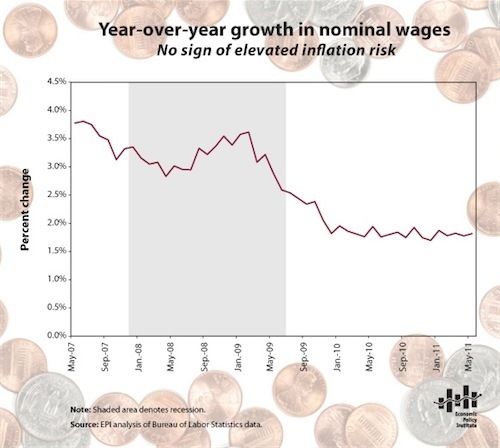
She makes the point that this is a very strange time to be worrying about an inflationary price-wage spiral.


If Park View Wants More Commercial Development, It Should Upzone Not Rename Metro Stations
Lydia DePillis that ANC Commissioner Kent Boese is pushing to have the Georgia Avenue / Petworth Metro Station name changed to incorporate the term "Park View" because "while they've seen significant development north of the station — on the Petworth side, which is also Ward 4 — streets to the south haven't improved as quickly, and literally putting Park View on the map might help potential retailers, developers, and restauranteurs look to that area as well."
I wish people would get in the habit of consulting the zoning map before speculating as to the origins of development patterns, and that's especially the case since the DC Office of Zoning has made a very user friendly one. A quick check suggests to me that commercial development is probably sparser in the Park View part of Georgia Avenue than in the Petworth part of Georgia Avenue because the Petworth part has business-friendly zoning:

In Petworth you've got C-3-A zoning, whereas in Park View it's C-2-A. Both also get a Georgia Avenue Overlay District granting an extra five feet of building heights for mixed-use developments. But the gap in zoning means that Petworth buildings can be fifteen feet taller, get a 1.5 percent Floor Area Ratio boost, and are allowed to occupy a larger share of the lot. Under the circumstances, it's not surprising that investment capital has tended to flow to the Petworth side. If Park View community leaders want to upzone to equalize with Petworth — or even to get denser than Petworth — that'd make a bigger difference than fiddling with Metro names.
To be preachy for a minute, I really urge everyone — including those who don't share my normative views about policy — to familiarize themselves with the zoning rules in the neighborhoods where they live. Just about everyone is interested in the question of their own neighborhood and what's around them. But almost nobody is interested in zoning. And yet, these things are intimately linked!


The Long, Sad History Of 'College Not Worth It Anymore' Articles
Kevin Carey has a fun piece up at TNR where instead of directly rebutting the current glut of articles postulating a glut of college educated workers, he simply looks back at the last few recessions' worth of such articles. I'm gonna skip to the punchline:
Back in 1982, the Post wrote about Mel Rodenstein, a Peace Corps alum with a master's degree in international affairs who was slaving away in a "mindless" file clerk job, forced to cut coupons and subsist on rice and beans. He went on to a series of nonprofit management jobs and, by 2010, was a senior research project supervisor at the Johns Hopkins University School of Health. In 1993, a Post article titled "Grads Without Jobs" described two young women graduating from good state universities who planned to spend a year wandering North America in a station wagon because "there are no jobs anyway." Today, one of them lives in Silver Spring, Maryland, and runs her own H.R. consulting firm. The other got a PhD and works 20 feet away from this author in a Washington, DC think tank.
Sally Cameron, meanwhile, isn't tending bar anymore. She's a senior manager at an international development consulting company that works under contract with USAID. Her recent work includes building railroads in cyclone-devastated Madagascar. Her liberal arts degree from Smith College must come in handy, since one of the two official languages there is French. That's how things usually work out for people who get college degrees.
The other thing that I always think is worth mentioning about this is career ladders. You don't need a college degree to be a cook in a restaurant. But if you're a good cook, you might want to start your own restaurant one day. And if you're looking to start a business, then I think you're going to find that skill in math, writing, etc. are all very useful. You don't really "need" to go to college to learn that stuff, but it's probably helpful, as are the personal and professional connections you might make in college.


Public Overestimates Cost Of Wars, Underestimates The Impact Of Bush Tax Cuts
Another point from the Pew survey of the public opinion and the deficit shows that people are a bit confused about where the deficit comes from:
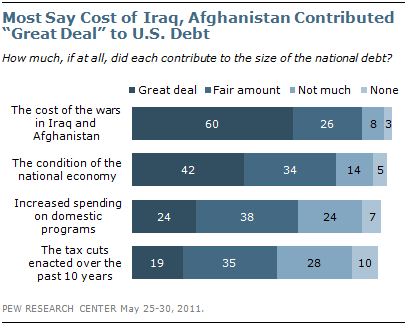
Of course these things do all contribute to the deficit. But the wars aren't as big a deal as people think, and the tax cuts are a much bigger deal than people realize. Here's the CBPP chart:
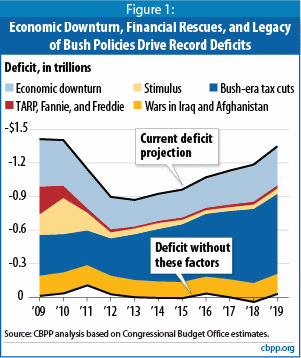
I'm not sure how much this is to blame, but perhaps part of the issue here is that fact that Democratic leaders have actually taken the majority of the Bush tax cuts off the table. Their focus is on repealing the Bush tax cuts "for the rich" meaning those cuts that only high income people receive. But the majority of the dollar value of the Bush tax cuts is attributable to his so-called "middle class" tax cuts and few people seem to know or care that the majority of the benefit of those cuts also go to high income people.


Matthew Yglesias's Blog
- Matthew Yglesias's profile
- 72 followers



